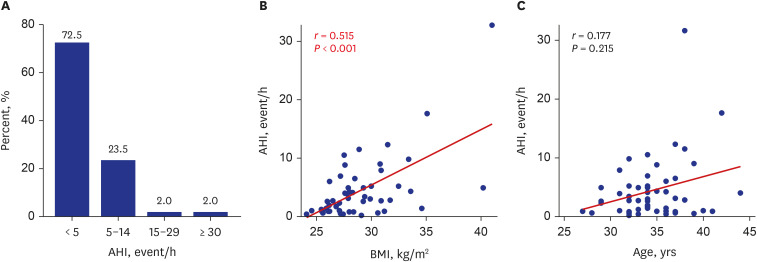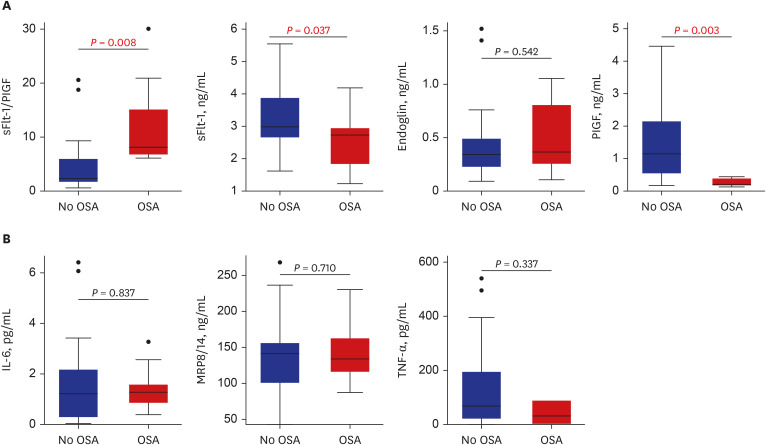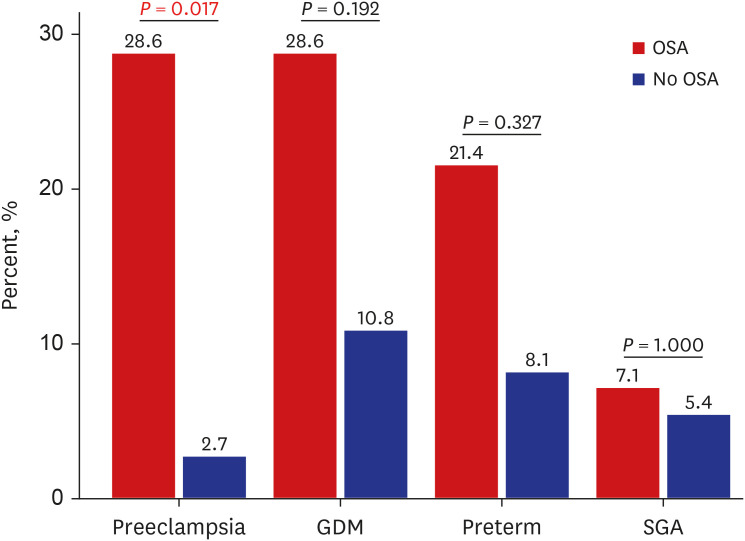J Korean Med Sci.
2023 Jan;38(2):e8. 10.3346/jkms.2023.38.e8.
Obstructive Sleep Apnea Is Associated With Late-Onset Preeclampsia in Overweight Pregnant Women in Korea
- Affiliations
-
- 1Department of Otorhinolaryngology-Head and Neck Surgery, Samsung Medical Center, Sungkyunkwan University School of Medicine, Seoul, Korea
- 2Department of Obstetrics and Gynecology, Chung-Ang University Hospital, Chung-Ang University College of Medicine, Seoul, Korea
- 3Department of Obstetrics and Gynecology, Samsung Medical Center, Sungkyunkwan University School of Medicine, Seoul, Korea
- KMID: 2537955
- DOI: http://doi.org/10.3346/jkms.2023.38.e8
Abstract
- Background
Obstructive sleep apnea (OSA) is closely related to maternal obesity in pregnant women, and the association increases with later pregnancy. Obesity and OSA are risk factors of pregnancy-related complications, including gestational hypertension, gestational diabetes mellitus (GDM), and fetal morbidities. We aimed to determine the prevalence of OSA and to assess the impact of OSA on pregnancy-related disorders in overweight pregnant women.
Methods
Eligible participants who were overweight [body mass index (BMI) ≥ 23 kg/m 2 ] in gestational age 30 weeks or more, assessed OSA using a portable polysomnography at home. Clinical data were collected from pregnant women and their babies.
Results
The average age of 51 participants was 34.5 years (27–44 years). The number of primipara was 25 (49%) and that of multipara was 26 (51%). Eight cases of GDM (15.7%) and five cases of preeclampsia (9.8%) were reported, and six patients (11.8%) experienced preterm delivery. In results of polysomnography, 14 patients (27.5%) were diagnosed as OSA. Apnea-hypopnea index moderately correlated with BMI (r = 0.515, P < 0.001). The BMI (P < 0.005) and preeclampsia rate (P < 0.017) were higher in the OSA group compared to the control group. Odds ratios (ORs) adjusting age, BMI, parity, and abortion history were calculated. The presence of OSA increased OR of preeclampsia (OR, 13.1; 95% confidence interval, 1.1–171.3). The majority of preeclampsia patients (4/5, 80%) underwent preterm delivery.
Conclusion
OSA is an important risk factor for preeclampsia, resulting in preterm delivery. For overweight pregnant women, an OSA evaluation should be mandatory.
Figure
Reference
-
1. Bourjeily G, Danilack VA, Bublitz MH, Lipkind H, Muri J, Caldwell D, et al. Obstructive sleep apnea in pregnancy is associated with adverse maternal outcomes: a national cohort. Sleep Med. 2017; 38:50–57. PMID: 29031756.2. Louis JM, Mogos MF, Salemi JL, Redline S, Salihu HM. Obstructive sleep apnea and severe maternal-infant morbidity/mortality in the United States, 1998–2009. Sleep (Basel). 2014; 37(5):843–849.3. Brown NT, Turner JM, Kumar S. The intrapartum and perinatal risks of sleep-disordered breathing in pregnancy: a systematic review and metaanalysis. Am J Obstet Gynecol. 2018; 219(2):147–161.e1. PMID: 29454869.4. Pengo MF, Rossi GP, Steier J. Obstructive sleep apnea, gestational hypertension and preeclampsia: a review of the literature. Curr Opin Pulm Med. 2014; 20(6):588–594. PMID: 25250803.5. Dominguez JE, Habib AS, Krystal AD. A review of the associations between obstructive sleep apnea and hypertensive disorders of pregnancy and possible mechanisms of disease. Sleep Med Rev. 2018; 42:37–46. PMID: 29929840.6. Rueda-Clausen CF, Stanley JL, Thambiraj DF, Poudel R, Davidge ST, Baker PN. Effect of prenatal hypoxia in transgenic mouse models of preeclampsia and fetal growth restriction. Reprod Sci. 2014; 21(4):492–502. PMID: 24084523.7. Voerman E, Santos S, Inskip H, Amiano P, Barros H, Charles MA, et al. Association of gestational weight gain with adverse maternal and infant outcomes. JAMA. 2019; 321(17):1702–1715. PMID: 31063572.8. Hou H, Zhao Y, Yu W, Dong H, Xue X, Ding J, et al. Association of obstructive sleep apnea with hypertension: a systematic review and meta-analysis. J Glob Health. 2018; 8(1):010405. PMID: 29497502.9. Chirinos JA, Gurubhagavatula I, Teff K, Rader DJ, Wadden TA, Townsend R, et al. CPAP, weight loss, or both for obstructive sleep apnea. N Engl J Med. 2014; 370(24):2265–2275. PMID: 24918371.10. Pamidi S, Marc I, Simoneau G, Lavigne L, Olha A, Benedetti A, et al. Maternal sleep-disordered breathing and the risk of delivering small for gestational age infants: a prospective cohort study. Thorax. 2016; 71(8):719–725. PMID: 27084956.11. Wilson DL, Walker SP, Fung AM, Pell G, O’Donoghue FJ, Barnes M, et al. Sleep-disordered breathing in hypertensive disorders of pregnancy: a BMI-matched study. J Sleep Res. 2018; 27(5):e12656. PMID: 29368415.12. Sarberg M, Bladh M, Josefsson A, Svanborg E. Sleepiness and sleep-disordered breathing during pregnancy. Sleep Breath. 2016; 20(4):1231–1237. PMID: 27085867.13. Jaimchariyatam N, Na-Rungsri K, Tungsanga S, Lertmaharit S, Lohsoonthorn V, Totienchai S. Obstructive sleep apnea as a risk factor for preeclampsia-eclampsia. Sleep Breath. 2019; 23(2):687–693. PMID: 30484015.14. Ko HS, Kim MY, Kim YH, Lee J, Park YG, Moon HB, et al. Obstructive sleep apnea screening and perinatal outcomes in Korean pregnant women. Arch Gynecol Obstet. 2013; 287(3):429–433. PMID: 23086136.15. Shin HY, Kang HT. Recent trends in the prevalence of underweight, overweight, and obesity in Korean adults: The Korean National Health and Nutrition Examination Survey from 1998 to 2014. J Epidemiol. 2017; 27(9):413–419. PMID: 28420559.16. Lim J, Han K, Kim SY, Cho YH, Yoon YS, Park HS, et al. Effects of central obesity on maternal complications in Korean women of reproductive age. Obes Res Clin Pract. 2019; 13(2):156–163. PMID: 30910529.17. von Dadelszen P, Magee LA, Roberts JM. Subclassification of preeclampsia. Hypertens Pregnancy. 2003; 22(2):143–148. PMID: 12908998.18. Lisonkova S, Sabr Y, Mayer C, Young C, Skoll A, Joseph KS. Maternal morbidity associated with early-onset and late-onset preeclampsia. Obstet Gynecol. 2014; 124(4):771–781. PMID: 25198279.19. Kim HY, Kim HJ. Prevalence of obstructive sleep apnea in obese pregnant women and its effects on pregnancy-related complications. Sleep Med. 2019; 64:S194.20. Pittman SD, Ayas NT, MacDonald MM, Malhotra A, Fogel RB, White DP. Using a wrist-worn device based on peripheral arterial tonometry to diagnose obstructive sleep apnea: in-laboratory and ambulatory validation. Sleep. 2004; 27(5):923–933. PMID: 15453551.21. Hypertension in pregnancy. Report of the American College of Obstetricians and Gynecologists’ Task Force on Hypertension in Pregnancy. Obstet Gynecol. 2013; 122(5):1122–1131. PMID: 24150027.22. Nikuei P, Rajaei M, Roozbeh N, Mohseni F, Poordarvishi F, Azad M, et al. Diagnostic accuracy of sFlt1/PlGF ratio as a marker for preeclampsia. BMC Pregnancy Childbirth. 2020; 20(1):80. PMID: 32033594.23. De Luca Canto G, Pachêco-Pereira C, Aydinoz S, Major PW, Flores-Mir C, Gozal D. Biomarkers associated with obstructive sleep apnea and morbidities: a scoping review. Sleep Med. 2015; 16(3):347–357. PMID: 25747333.24. Pamidi S, Pinto LM, Marc I, Benedetti A, Schwartzman K, Kimoff RJ. Maternal sleep-disordered breathing and adverse pregnancy outcomes: a systematic review and metaanalysis. Am J Obstet Gynecol. 2014; 210(1):52.e1–52.14.25. Chen YH, Kang JH, Lin CC, Wang IT, Keller JJ, Lin HC. Obstructive sleep apnea and the risk of adverse pregnancy outcomes. Am J Obstet Gynecol. 2012; 206(2):136.e1–136.e5.26. Bin YS, Cistulli PA, Ford JB. Population-based study of sleep apnea in pregnancy and maternal and infant outcomes. J Clin Sleep Med. 2016; 12(6):871–877. PMID: 27070246.27. Facco FL, Parker CB, Reddy UM, Silver RM, Koch MA, Louis JM, et al. Association between sleep-disordered breathing and hypertensive disorders of pregnancy and gestational diabetes mellitus. Obstet Gynecol. 2017; 129(1):31–41. PMID: 27926645.28. Facco FL, Redline S, Hunter SM, Zee PC, Grobman WA, Silver RM, et al. Sleep-disordered breathing in pregnancy and after delivery: associations with cardiometabolic health. Am J Respir Crit Care Med. 2022; 205(10):1202–1213. PMID: 35144521.29. Kapur VK, Auckley DH, Chowdhuri S, Kuhlmann DC, Mehra R, Ramar K, et al. Clinical practice guideline for diagnostic testing for adult obstructive sleep apnea: an American Academy of Sleep Medicine Clinical Practice Guideline. J Clin Sleep Med. 2017; 13(3):479–504. PMID: 28162150.30. Yinon D, Lowenstein L, Suraya S, Beloosesky R, Zmora O, Malhotra A, et al. Pre-eclampsia is associated with sleep-disordered breathing and endothelial dysfunction. Eur Respir J. 2006; 27(2):328–333. PMID: 16452588.31. Yalamanchali S, Farajian V, Hamilton C, Pott TR, Samuelson CG, Friedman M. Diagnosis of obstructive sleep apnea by peripheral arterial tonometry: meta-analysis. JAMA Otolaryngol Head Neck Surg. 2013; 139(12):1343–1350. PMID: 24158564.32. Choi W, Bae M, Chung Y. The impact of national health insurance coverage on compliance with positive airway pressure therapy in patients with obstructive sleep apnea. Clin Exp Otorhinolaryngol. 2022; 15(1):100–106. PMID: 33561916.33. Jeon HJ, Bang YR, Yoon IY. A validation study on three screening questionnaires for obstructive sleep apnea in a Korean community sample. Sleep Breath. 2019; 23(3):969–977. PMID: 30448963.34. Xia W, Huang Y, Peng B, Zhang X, Wu Q, Sang Y, et al. Relationship between obstructive sleep apnoea syndrome and essential hypertension: a dose-response meta-analysis. Sleep Med. 2018; 47:11–18. PMID: 29880142.35. Zeisler H, Llurba E, Chantraine F, Vatish M, Staff AC, Sennström M, et al. Predictive value of the sFlt-1:PlGF ratio in women with suspected preeclampsia. N Engl J Med. 2016; 374(1):13–22. PMID: 26735990.




